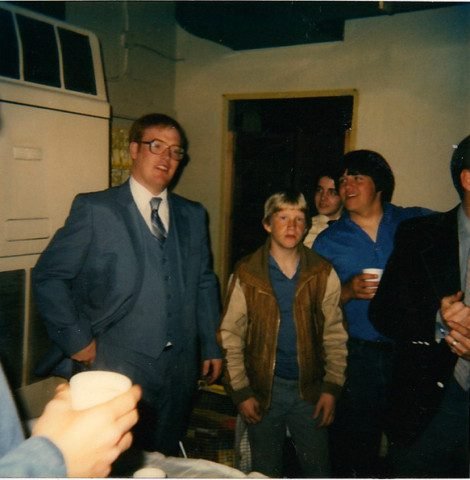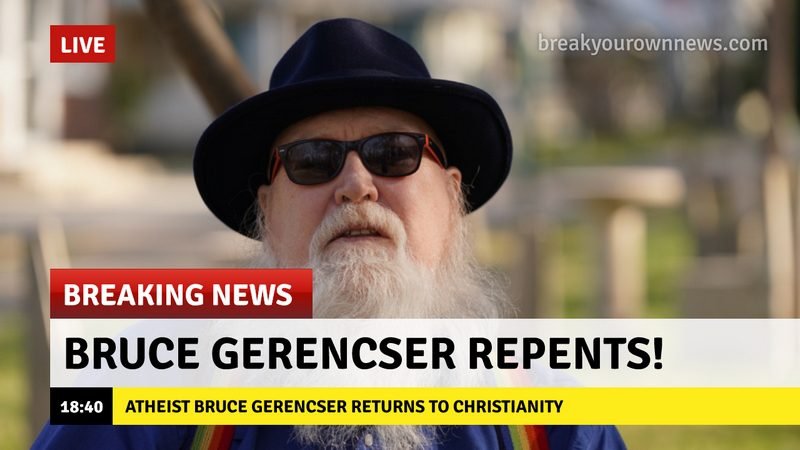
Several years ago, I received the following email:
I read your blog. Thanks for sharing. I have been an Evangelical Christian since I was 5. I accepted Jesus of the Bible at that time. When I read your “Why I Hate Jesus”, it made me sad. I couldn’t help but think that you have had a lot of pain from people who profess Jesus Christ and that Jesus Himself has let you down. I did have a question. On your ABOUT page, the question was “when were you called into the ministry. ” If you don’t believe in Jesus anymore, who do you think called you into the ministry?
In this post, I want to focus on the question, “If you don’t believe in Jesus anymore, who do you think called you into the ministry?”
This is a fairly common question I am asked when someone is trying to square my current atheistic life with that of the twenty-five years I spent in the ministry. I believed that it was GOD who called me into the ministry, but now I believe that this same God is a fiction. If God doesn’t exist, who is it then that spoke to my “heart” as a fifteen-year-old boy, telling me that I was to be a pastor, a preacher of the good news of the gospel?
The Evangelical culture I grew up in emphasized the importance of boys and girls growing up to be full-time servants of Jesus Christ. Children and teenagers were encouraged to pray and ask God if he wanted them to devote their lives to the ministry, be it as a pastor, evangelist, or missionary. As Hannah did with Samuel, parents were challenged to give their children over to God, hoping that he might see fit to use them in a mighty way to advance his Kingdom. Pastors considered it a sign of God’s favor if teen boys were called to preach under their ministry. Like the gunslingers of yesteryear, pastors put a notch on their gospel gun every time a boy surrendered to the ministry.
Being called to full-time service means you are special, uniquely chosen by God to do his work. From the moment a boy says, preacher, I think God is calling me to preach, he is treated by the church as some sort of extraordinary human being. I heard countless preachers say that being called into the ministry was the greatest calling in the world; that becoming President of the United States would be a step down from the ministry. Preacher boys — as young men called into the ministry are often nicknamed — are quickly given preacher things to do. No time is better than NOW, I was told, to start serving God and preaching his Word. I preached my first sermon to the Junior High Sunday school class two weeks after I stood before the church and said, God is calling me to be a preacher. I spent the next few years honing my preaching skills at youth meetings, nursing homes, and any other place that didn’t mind hearing the ramblings of an inexperienced, uneducated boy preacher. By the time I delivered my last sermon in April 2005, I had preached 4,000+ messages, often preaching three or more sermons a week.
What I have written above is key to answering the question, “If you don’t believe in Jesus anymore, who do you think called you into the ministry?” Since I don’t think God exists, the only way I can possibly answer this question is from an environmental, psychological, cultural, and sociological perspective. It is important to remember that it is not necessary for God to exist for people to believe that he does. Billions of people believe in a supernatural deity/force that does not exist. Every day, billions of people will pray to, worship, and swear allegiance to deities that cannot be seen, heard, or touched. These deities can, however, be felt, and it is these feelings that lead people to believe that their invisible God is indeed real. Thus, I KNOW that God called me into the ministry because I “felt” him speak to me. This is no different from the five-year-old Bruce Gerencser believing that Santa Claus somehow came down the chimney every Christmas Eve and put presents under the tree just for him. Of course, time, experience, and knowledge caused me to see that my beliefs about Santa were false, as they did when it came to my beliefs about God.
These religious feelings and beliefs of mine were reinforced by the Bible. Various verses in the Word of God speak of men who are called to be pastors/elders/bishops/missionaries/evangelists. Variously interpreted by Christian sects, all agree on one point: God calls boys/men (and in some cases, girls/women) into the ministry. This calling is essentially God laying his hand on someone and saying, I have set you apart for my use. Church youngsters are regaled with stories about men and women called by God who did great works. From the Bible, stories of the faith-driven exploits of Noah, Moses, David, Gideon, Elijah, Elisha, Joshua, the apostles, and Paul are used as reminders of what God can and will do for those willing to dedicate their lives to serving him. Church children are encouraged to read the biographies of men (and a few women) mightily used by God. I heard more than a few preachers say, look at what God did through Charles Spurgeon, John Wesley, Dwight Moody, Bob Jones, John R. Rice, Billy Sunday, Adoniram Judson, Andrew Fuller, David Brainerd, Jonathan Edwards, George Whitefield, Charles Finney, Jack Hyles, B.R. Lakin, and countless other servants of God. Who knows what God might do through you if you will dare to surrender your life to him? What young preacher boy wouldn’t want to be someday used by God like these men?
I spent thirty-three years believing that God had called me to preach the unsearchable riches of Jesus Christ; that this calling was irrevocable; that misery and judgment (and perhaps death) awaited if I failed to obey God. The Apostle Paul said in First Corinthians 9:16:
For though I preach the gospel, I have nothing to glory of: for necessity is laid upon me; yea, woe is unto me, if I preach not the gospel!
As with Paul, Bruce the Evangelical preacher had a burning desire to preach the gospel; to tell as many people as possible that Jesus alone can save them from their sin; that there is a Hell to shun and a Heaven to gain; that what is a man profited if he gain the world and lose his soul. I shed countless tears over the lost — both in and out of the church. I spent untold hours praying for revival to break out in America, spreading to the ends of the earth. Believing Jesus was coming back to earth soon, I devoted myself to making sure as many people as possible heard the gospel. I thought, at the time, my duty is to tell them. It is up to God to save them. For many years, my evangelistic zeal burned so hot that I preached a minimum of four sermons a week, along with preaching on the streets and holding services at the local nursing home and county jail. To quote the motto of Midwestern Baptist College — the institution I attended in the 1970s — Souls for Jesus is Our Battle Cry, Souls for Jesus is Our Battle Cry. We Never Will Give in While Souls are Lost in Sin, Souls for Jesus is Our Battle Cry!
My burning the candle at both ends wouldn’t have been possible if I didn’t believe that God had called me into the ministry and was speaking to and through me. I believed that this God existed. I may never have seen God or audibly heard him, but I felt his presence in my life. I “heard” the Holy Spirit speaking to me, leading me, and teaching me truth. These experiences of mine were verified by what I read in the Bible and Christian biographies and what I observed in the lives of my pastors, teachers, and mentors. Most of all, they were verified by the work God accomplished through my preaching and leadership. How then, knowing these things, can I now believe that God is a work a fiction; that my ministerial experiences were the work, not of God/Jesus/Holy Spirit, but the works of a quite-human Bruce Gerencser?
The deconversion process afforded me the opportunity to step back from my life and view it from a distance. As I looked at my parents’ religious, theological, social, and political leanings and that of the pastors of the churches we attended, it would have been shocking if I hadn’t, as a teenager, professed that God was calling me into the ministry. At age five, while we were living in San Diego and attending Scott Memorial Baptist Church (Scott Memorial was pastored by Tim LaHaye), I told my mother that I was going to be a preacher someday. Not a baseball player, policeman, or garbage truck driver — a preacher! This, of course, pleased my Mom. (Ironically, neither my mother or father ever heard me preach.) When people talked about the angst they had over trying to determine what they wanted to do with their lives when they grew up, I had no frame of reference. I never wrestled with what I wanted to be as an adult. I always wanted to be a preacher, and by God’s wonderful, matchless grace, that is exactly what I became. Everything I experienced in my life led me to the monumental day at Trinity Baptist Church in Findlay, Ohio, when, with tears and trembling, I told the church God was calling me into the ministry. Scores of fellow church members shouted Amen! and later hugged me, telling me that they would pray for me. I am sure that more than a few people had mixed feelings about my calling. Really Lord? Are you sure you can use this temperamental, ornery redheaded boy? I have often wondered what my peers thought as I went from the boy who told the youth director to fuck off! to a young man who loved Jesus, carried his Bible to school, handed out tracts to his unsaved friends, went soulwinning, worked on a bus route, and occasionally preached at Sunday evening youth meetings. The old Bruce, who wore frayed jeans, boots, and tee-shirts to church, gave way to the New Bruce, who wore preacher clothes, including ties. What’s next? Swearing off girls? Anyone who knew me as a preacher boy knows I resolutely obeyed the Baptist Rulebook®. (Please read The Official Independent Baptist Rulebook) I didn’t smoke, drink, cuss, listen to rock music, or engage in premarital sex. I had plenty of girlfriends, but I drew the line at kissing, holding hands, and putting our arms around each other. My commitment to virginity was part of my devotion to God. As much as I wanted to have sex, I willingly took many a cold shower, keeping myself pure until my wedding day.
Most Baptist preachers will likely say that they just KNEW God was calling them to preach. If they are still Christians, I am sure they attribute their feelings to supernatural intervention. It’s all because of J-E-S-U-S, not me, I’m sure they’ll say, yet the signs in front of their churches say Rev. So-and-So, Pastor. You see, the whole notion of being called by God is rooted not in the supernatural, but in earthly human experiences. My Baptist faith taught me to call my interest in the ministry a calling from God, but in truth, it was the natural outcome of my upbringing and experiences. My entrance into the preaching fraternity was never in doubt. How could I not have become a preacher?
There is nothing in my story that requires the actual existence of a supernatural deity. All that is required is that I, along with the other players in my life, believe God exists. For my first fifty years of life, I believed that the Evangelical God was every bit a real as the sun, moon, stars, and earth. And now I don’t. Does this invalidate my years in the ministry? Of course not. All that has changed is my perspective and how I see my trajectory from a sinner to a Holy Spirit-led follower of Jesus Christ. Instead of God being the first cause, I now know that environmental, psychological, cultural, and sociological influences molded me into the man who would one day preach thousands of sermons in churches in Ohio, Texas, and Michigan. Congregants called me Pastor Bruce, Rev. Gerencser, or Preacher — the man of God who spoke the Word of God to the people of God. I now know who I really was . . . his name is Bruce.
Bruce Gerencser, 68, lives in rural Northwest Ohio with his wife of 47 years. He and his wife have six grown children and sixteen grandchildren. Bruce pastored Evangelical churches for twenty-five years in Ohio, Texas, and Michigan. Bruce left the ministry in 2005, and in 2008 he left Christianity. Bruce is now a humanist and an atheist.
Your comments are welcome and appreciated. All first-time comments are moderated. Please read the commenting rules before commenting.
You can email Bruce via the Contact Form.









